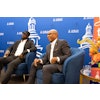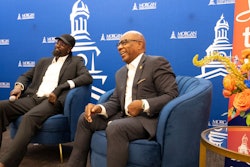NASHVILLE, Tenn. — Each year, China gathers more than 300 of its smartest high school seniors in Hangzhou, and Douglas Christiansen is there to tell them why they should consider attending Vanderbilt University.
Last week, 100 of them chose to hear a pitch from Christiansen, Vanderbilt’s dean of admissions, over recruiters from Massachusetts Institute of Technology, Harvard University and Nanyang Technological University in Singapore. In flawless, formal English, the students peppered Christiansen with questions for more than an hour.
“Will you take into account that we do not choose our own curriculum?”
“How do we promote ourselves in essays?”
“What should our letters of recommendation say?”
Any one of them could become part of Vanderbilt’s 2011 freshman class, moving the school toward Christiansen’s goal of 7 percent international undergraduate enrollment by 2014.
Universities in Middle Tennessee are working harder to attract first-year students from overseas setting enrollment goals, adding positions and hiring recruiting companies. All cite the same reason: In a global economy, it makes sense to form early relationships with future decision-makers. Public universities have an added financial incentive: International students’ tuition and fees can be three times as much as in-state.
And, while there may be challenges with individual students, none cited common pitfalls.
“International student recruiting has become a high priority, more and more of one,” said Ursula Oaks, spokesperson for NAFSA: Association of International Educators. “Campuses realize they gain a lot. … It puts American students in touch with people from other countries. They bring tuition dollars, spend money in the local community, and bolster science and engineering programs by filling seats American students don’t.”
Middle Tennessee State University sends administrators to Asia and the Middle East to recruit. The campus was chosen last year to host a Confucius Institute one of two in the United States to exchange students, language and culture with Hangzhou Normal University.
“We want to target the entire world, but it’s a big place, and we’re just getting started,” said Michael Allen, vice provost for research and dean of the college of graduate studies.
The only downside has been a few foreign students’ weakness in speaking English, he said. The university enrolls those students at an English-language school near campus until their skills improve. After that, he said, they’re conscientious, hard workers.
The university plans to hire its first vice provost of international education by Jan. 1, someone who can bring together recruitment efforts across campus, Allen said. The search begins in September.
In the last year, MTSU’s enrollment from China graduate and undergraduate jumped from 29 to 44. Enrollment from Saudi Arabia grew even more, from 19 to 74. Even with those efforts, international students constitute a small percentage of total enrollment 367 of 23,653 students enrolled in the spring semester.
Allen said about 200 of those are in graduate programs.
Foreign students historically make up a higher percentage of graduate programs because the United States offers more options at that level than other nations, plus it’s easier for them to get financial aid.
Going to Madagascar
For Jim Thomas, executive assistant to the president at Lipscomb University, increasing international enrollment was a matter for prayer. He believed it would be good exposure for American students and their foreign counterparts.
In 2008, he learned that Lipscomb could pick 26 of Madagascar’s top high school students, with their tuition and expenses paid by that government. The school is affiliated with the Church of Christ, and other church business in Madagascar put it on the government’s radar.
The arrangement hasn’t been without complications. Madagascar paid the tuition and fees for the students’ freshman and sophomore years. Then an uprising ousted the president who inked the deal with Lipscomb, forcing him to live in exile, and the government’s finances are in disarray, with a $934,000 payment due to Lipscomb for the students’ junior year.
Thomas said Lipscomb is considering ways to keep its Malagasy students but isn’t ready to share those ideas.
It’s stressful for the students, most of whom planned to attend universities in Madagascar before this opportunity arose. As of last semester, none carried less than a B average.
One, computer science major Andry Randriamanohisoa, said his father discouraged him from coming home for his mother’s funeral in December in case the political instability prevented his return to Lipscomb. Randriamanohisoa, 20, was able to get there and back with help from the U.S. State Department, but he understood his father’s stance.
“It is the greatest opportunity imaginable to study abroad,” he said.
Lipscomb seeks other students with the same attitude through Eli 360, a faith-based international student recruiting company. Sylvia Braden, who handles international student admissions for Lipscomb, said the company is paid based on the number of applications it delivers.
“They’ve helped get our foot in that market,” she said. “It’s more cost-effective to have them already overseas than to send me over there.”
Of the school’s 3,400 graduate and undergraduate students, 63 are international.
Dispelling Stereotypes
Christiansen, who’s also Vanderbilt’s vice provost for enrollment, said international students made up about 2.5 percent of incoming freshman classes for years until the school decided to recruit harder overseas. Since then, the number has risen steadily.
International students who apply must meet the same criteria as U.S. students, he said. In addition, they face stiffer competition for need-based financial aid.
Christiansen said the recent global economic crisis showed just how connected nations are, so it’s vital that students begin thinking internationally early on if they’re going to be successful later. Vanderbilt doesn’t just want diversity from one part of the world the university recruits in Asia, Europe, South and Central America, and elsewhere.
The ultimate goal is to dispel stereotypes about citizens of other nations and create more global understanding.
“I may not believe what you believe, but I had better understand it, because we’re going to have to work together,” Christiansen said.
Ga In Kim, a sophomore from South Korea, said she picked Vanderbilt because she liked its “work hard, play hard” philosophy.
In Nashville, she has dispelled some stereotypes.
“I thought after Americans turned 18, they just moved out of their parents’ house and lived their lives,” she said. “But I made American friends and learned you still love your family that relationship is still there.
“I learned there’s not much difference between people just because they’re from different countries.”















